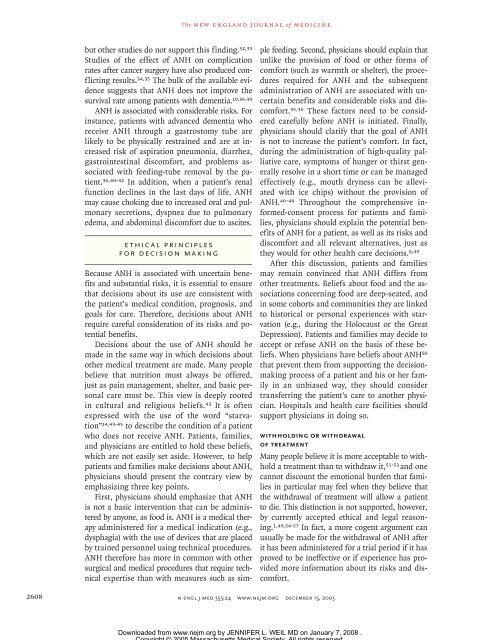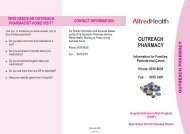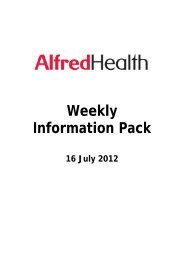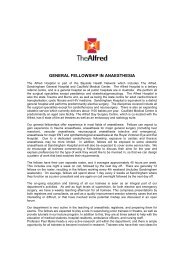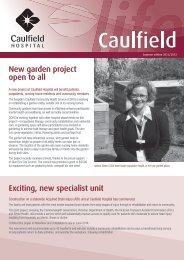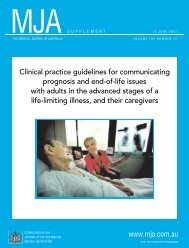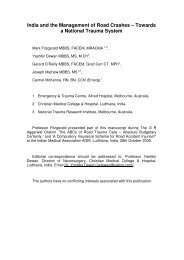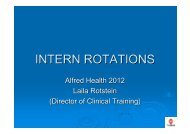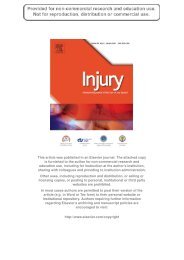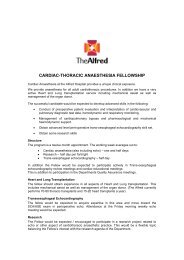Appropriate Use of Artificial Nutrition and Hydration — Fundamental ...
Appropriate Use of Artificial Nutrition and Hydration — Fundamental ...
Appropriate Use of Artificial Nutrition and Hydration — Fundamental ...
Create successful ePaper yourself
Turn your PDF publications into a flip-book with our unique Google optimized e-Paper software.
The new engl<strong>and</strong> journal <strong>of</strong> medicine<br />
but other studies do not support this finding. 32,33<br />
Studies <strong>of</strong> the effect <strong>of</strong> ANH on complication<br />
rates after cancer surgery have also produced conflicting<br />
results. 34,35 The bulk <strong>of</strong> the available evidence<br />
suggests that ANH does not improve the<br />
survival rate among patients with dementia. 19,36-39<br />
ANH is associated with considerable risks. For<br />
instance, patients with advanced dementia who<br />
receive ANH through a gastrostomy tube are<br />
likely to be physically restrained <strong>and</strong> are at increased<br />
risk <strong>of</strong> aspiration pneumonia, diarrhea,<br />
gastrointestinal discomfort, <strong>and</strong> problems associated<br />
with feeding-tube removal by the patient.<br />
36,40-42 In addition, when a patient’s renal<br />
function declines in the last days <strong>of</strong> life, ANH<br />
may cause choking due to increased oral <strong>and</strong> pulmonary<br />
secretions, dyspnea due to pulmonary<br />
edema, <strong>and</strong> abdominal discomfort due to ascites.<br />
ethical principles<br />
for decision making<br />
Because ANH is associated with uncertain benefits<br />
<strong>and</strong> substantial risks, it is essential to ensure<br />
that decisions about its use are consistent with<br />
the patient’s medical condition, prognosis, <strong>and</strong><br />
goals for care. Therefore, decisions about ANH<br />
require careful consideration <strong>of</strong> its risks <strong>and</strong> potential<br />
benefits.<br />
Decisions about the use <strong>of</strong> ANH should be<br />
made in the same way in which decisions about<br />
other medical treatment are made. Many people<br />
believe that nutrition must always be <strong>of</strong>fered,<br />
just as pain management, shelter, <strong>and</strong> basic personal<br />
care must be. This view is deeply rooted<br />
in cultural <strong>and</strong> religious beliefs. 43 It is <strong>of</strong>ten<br />
expressed with the use <strong>of</strong> the word “starvation”<br />
14,43-45 to describe the condition <strong>of</strong> a patient<br />
who does not receive ANH. Patients, families,<br />
<strong>and</strong> physicians are entitled to hold these beliefs,<br />
which are not easily set aside. However, to help<br />
patients <strong>and</strong> families make decisions about ANH,<br />
physicians should present the contrary view by<br />
emphasizing three key points.<br />
First, physicians should emphasize that ANH<br />
is not a basic intervention that can be administered<br />
by anyone, as food is. ANH is a medical therapy<br />
administered for a medical indication (e.g.,<br />
dysphagia) with the use <strong>of</strong> devices that are placed<br />
by trained personnel using technical procedures.<br />
ANH therefore has more in common with other<br />
surgical <strong>and</strong> medical procedures that require technical<br />
expertise than with measures such as simple<br />
feeding. Second, physicians should explain that<br />
unlike the provision <strong>of</strong> food or other forms <strong>of</strong><br />
comfort (such as warmth or shelter), the procedures<br />
required for ANH <strong>and</strong> the subsequent<br />
administration <strong>of</strong> ANH are associated with uncertain<br />
benefits <strong>and</strong> considerable risks <strong>and</strong> discomfort.<br />
35,36 These factors need to be considered<br />
carefully before ANH is initiated. Finally,<br />
physicians should clarify that the goal <strong>of</strong> ANH<br />
is not to increase the patient’s comfort. In fact,<br />
during the administration <strong>of</strong> high-quality palliative<br />
care, symptoms <strong>of</strong> hunger or thirst generally<br />
resolve in a short time or can be managed<br />
effectively (e.g., mouth dryness can be alleviated<br />
with ice chips) without the provision <strong>of</strong><br />
ANH. 46-48 Throughout the comprehensive informed-consent<br />
process for patients <strong>and</strong> families,<br />
physicians should explain the potential benefits<br />
<strong>of</strong> ANH for a patient, as well as its risks <strong>and</strong><br />
discomfort <strong>and</strong> all relevant alternatives, just as<br />
they would for other health care decisions. 8,49<br />
After this discussion, patients <strong>and</strong> families<br />
may remain convinced that ANH differs from<br />
other treatments. Beliefs about food <strong>and</strong> the associations<br />
concerning food are deep-seated, <strong>and</strong><br />
in some cohorts <strong>and</strong> communities they are linked<br />
to historical or personal experiences with starvation<br />
(e.g., during the Holocaust or the Great<br />
Depression). Patients <strong>and</strong> families may decide to<br />
accept or refuse ANH on the basis <strong>of</strong> these beliefs.<br />
When physicians have beliefs about ANH 50<br />
that prevent them from supporting the decisionmaking<br />
process <strong>of</strong> a patient <strong>and</strong> his or her family<br />
in an unbiased way, they should consider<br />
transferring the patient’s care to another physician.<br />
Hospitals <strong>and</strong> health care facilities should<br />
support physicians in doing so.<br />
withholding or withdrawal<br />
<strong>of</strong> treatment<br />
Many people believe it is more acceptable to withhold<br />
a treatment than to withdraw it, 51-53 <strong>and</strong> one<br />
cannot discount the emotional burden that families<br />
in particular may feel when they believe that<br />
the withdrawal <strong>of</strong> treatment will allow a patient<br />
to die. This distinction is not supported, however,<br />
by currently accepted ethical <strong>and</strong> legal reasoning.<br />
1,49,54-57 In fact, a more cogent argument can<br />
usually be made for the withdrawal <strong>of</strong> ANH after<br />
it has been administered for a trial period if it has<br />
proved to be ineffective or if experience has provided<br />
more information about its risks <strong>and</strong> discomfort.<br />
2608<br />
n engl j med 353;24 www.nejm.org december 15, 2005<br />
Downloaded from www.nejm.org by JENNIFER L. WEIL MD on January 7, 2008 .<br />
Copyright © 2005 Massachusetts Medical Society. All rights reserved.


